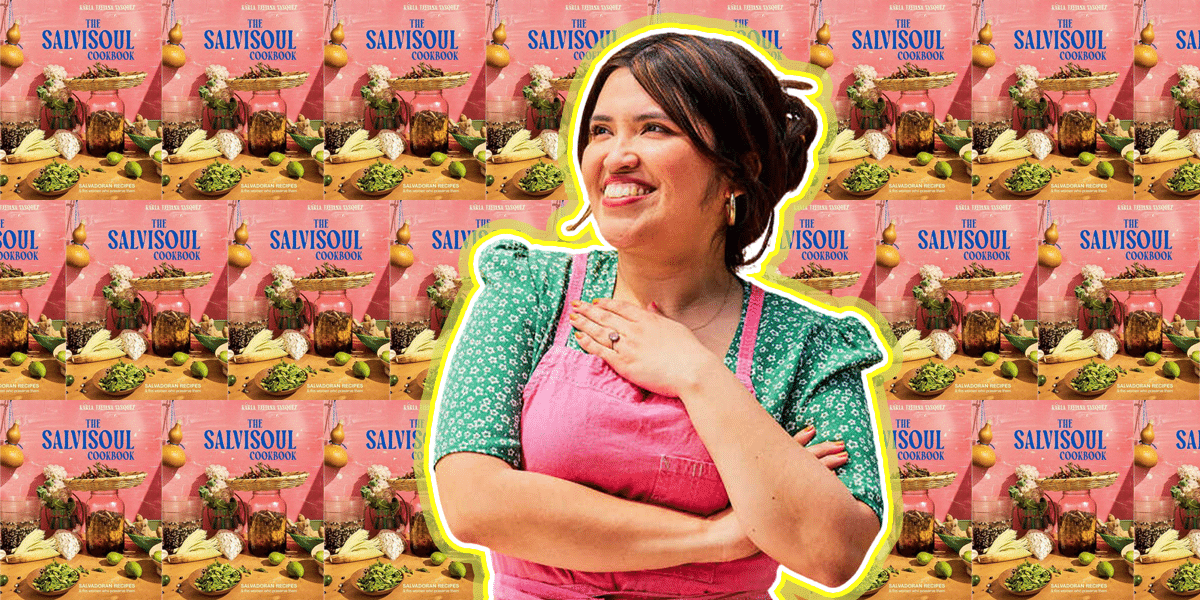Karla Tatiana Vásquez has been on a mission to educate the masses about the uniqueness of Salvadoran cuisine for years now. Vásquez created an online community, taught cooking classes, and created Salvi Los Angeles, a web series about Salvadoran food in Los Angeles. Her latest project is The SalviSoul Cookbook.
The SalviSoul Cookbook took about eight years to write and is the first traditionally published Salvadoran cookbook in the US. It features the stories of women who contributed recipes, beautiful photography, and gorgeous food styling. Here’s my Q&A with Karla Tatiana Vásquez, which has been edited and condensed for clarity.

INGRID CRUZ: The SalviSoul Cookbook is the first cookbook I ever read because you included the stories of many of the women who contributed recipes. What influenced you to do that?
KARLA TATIANA VÁSQUEZ: Most people who write cookbooks are restaurateurs or celebrity chefs with decades in the spotlight. The people I trusted in the food industry were women. It felt right to center my matriarchs and educators. This book started when I pitched this idea to my grandmother, Mama Lucy. As I interviewed her, she would explain the food and share stories.
That’s how I was raised. You’d get the food nourishing your physical form and the story nourishing the part of your soul that wants to understand where you’re from. Including the SalviSoul women’s stories was the only way I could do this book.
INGRID CRUZ: Books are a team effort. Earlier, you talked about how including all the voices of the SalviSoul women was an asset. What kept you going as you worked on this idea?
KARLA TATIANA VÁSQUEZ: I always longed for community. My family left our country and there was an element of separation. There was, “Oh, you don’t have papers. If you’re not on your P’s and Q’s, you could get caught by la migra.” I always felt food brought people together. It was the antidote to separation.
Writing this book with the SalviSoul women has created a space for me to unpack my womanhood. There was a lot of intention and teamwork because writing it alone was brutal. I started this book with my grandmother. When she first got sick, I kept thinking, “I need to work on this because she and I started this.”
My grandmother immediately got that this book is about the legacy of Salvadoran women. She saw that this was important work. When she passed, I needed to work out my grief.
Most people who write cookbooks are restaurateurs or celebrity chefs with decades in the spotlight. The people I trusted in the food industry were women. It felt right to center my matriarchs and educators.
Karla Tatiana Vásquez
INGRID CRUZ: I feel like a lot of Salvadorans are good with plants. What surprised you about the connection between Salvadoran people at home or abroad with the land?
KARLA TATIANA VÁSQUEZ: I love that observation. When I would go visit the women featured in this book, the first thing many would say was, “Let me show you my jardín. It’s out back.”
I did food justice organizing in LA. The pursuit of justice in working-class communities informs what I write about or where I focus my research. My great-grandmother, Mama Juana, worked in cafetales. She learned about food because she couldn’t keep picking coffee. It was back-breaking work. She found a job in la cocina making three tortillas for about 200 employees. In our family, the standard for 30 years was Mama Juana. She was on the ground making hundreds of tortillas a day.
The muscle memory in those hands is what guaranteed another day of sustenance. For me, the land and the people are very connected.
Writing this book with the SalviSoul women has created a space for me to unpack my womanhood. There was a lot of intention and teamwork.
Karla Tatiana Vásquez
INGRID CRUZ: What recipes do you still want to explore? Is there anything you wanted to include in the book that you had to cut out? Will there be a book two?
KARLA TATIANA VÁSQUEZ: I’m working on my second cookbook proposal. I feel I scratched the surface here. I don’t think we realize how little we’ve been able to document our foodways in El Salvador.
There was a traumatic thing as I continued this project: losing my grandmother. There was a true metamorphosis in me because the book required me to change and evolve. That’s why this project feels like more than a career move. It’s a document of intergenerational healing.
Wealthy white American authors are allowed to feel fascinated about something and get book deals for them. The things that get greenlit for people of color usually have to do with our emotional pain. I’m not fascinated, but I don’t want to run away from our trauma. Now we have this document that shows the prognosis looks good. We can get to a place where we can hold our truth. We can make more informed choices that benefit the individual and the collective.

The SalviSoul Cookbook is available for pre-order and is officially out on April 30.

